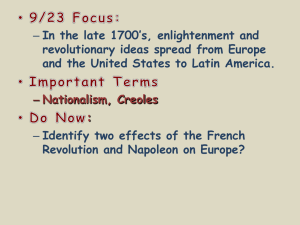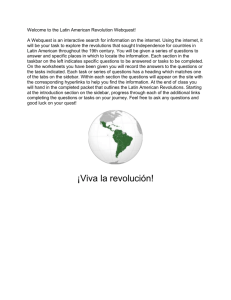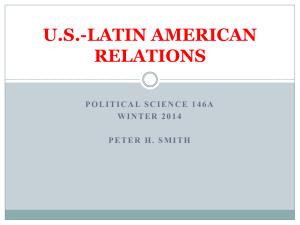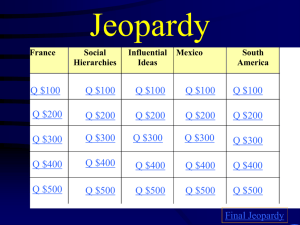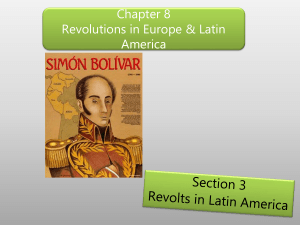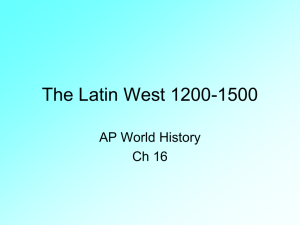Latin American Revolution
advertisement
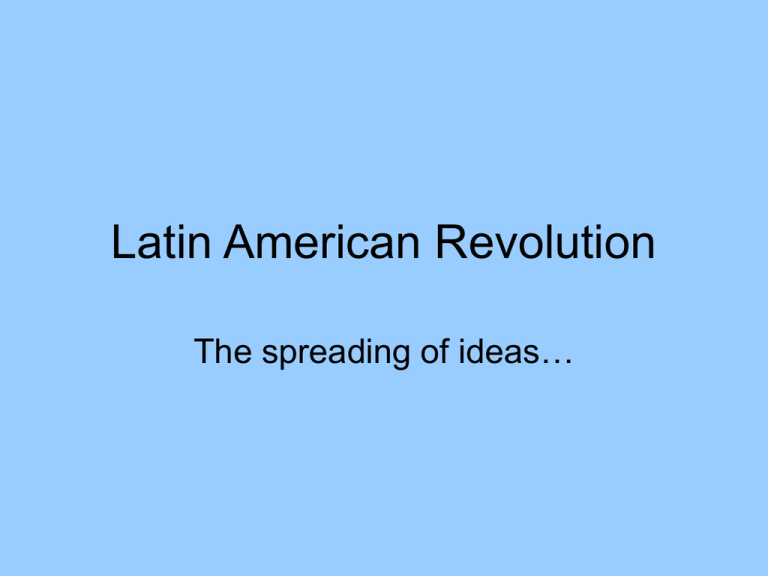
Latin American Revolution The spreading of ideas… Latin America = Mexico, Central America and South America Why do people revolt? Revolutionary Fever • Latin American discontent was rooted in the social, racial and political system that they were forced under for 300 years. • A social structure existed that created inequalities. Latin American Social Structure Land owners from Spain/Europe People born in the Americas of European decent Half Hispanic / half European From Africa Half African / half European From Americas The spark • The spark that finally ignited revolution in Latin America was Napoleon Bonaparte’s invasion of Spain in 1808. • Napoleon ousted the King and placed his own brother (Joseph) on the Spanish throne. • Latin American leaders saw Spain’s weakness as an opportunity to get rid of foreign domination in their own countries and demand independence from colonial rule. Revolution in Haiti • A French possession • Many were enraged over the issue of slavery. • Toussaint L’Ouverture, a slave fought to help Haiti gain their independence from the French. http://cyberschoolbus.un.org/infonation/map s/haiti.gif Toussaint L”Ouverture http://www.pbs.org/independentlens/natturner/images/timeline_toussaint.jpg Revolution in Mexico • Father Miguel Hidalgo, and Jose Morelos fought to end foreign rule of their nation. • Each had minimal success http://redescolar.ilce.edu.mx/redescolar/efemerides/julio/hidalgo.gif Revolution in South America • One of the first challenges was led by Tupac Amaru (an Incan descendant) he brought attention to the slavery issue. • Spain eventually ended the encomienda system (slavery). http://mrzine.monthlyreview.org/TupacAmaruIIbyJoseGabrielCondo rcanqui227.jpg Simon Bolivar “The Liberator” • Built an army and fought the Spanish. • He joined forces with Jose de San Martin and together they defeated the Spanish. • Bolivar united the lands and created Gran Colombia http://www.ellibertador.com/images/Simon%20Bolivar%201.JPG Revolutionary Failure • Bolivar said near his death in 1830 – “We have achieved our independence at the expense of everything else.” – South America’s common people had simply changed one set of masters for another. 1. Simon Bolivar and Miguel Hidalgo, leaders of Latin American independence movements, were inspired by successful revolutions in 1. the United States and France 2. the Soviet Union and China 3. Cuba and Costa Rica 4. Egypt and Kenya 2. During the early 1800’s, which was a major influence on the struggle for political independence in Latin America? 1. poor conditions in urban centers in Latin America 2. the American and French Revolutions 3. the desire of the Roman Catholic Church in Latin America to escape European control 4. demands by Latin American workers to own their own factories 3. One similarity in the leadership of Latin Americas Jose de San Martin, Toussaint l’Ouverture, Bernardo O’Higgins, and Pedro I was that each leader 1. opposed United States intervention in Haiti 2. led a struggle to gain freedom for the people of his nation 3. opposed membership of his nation in the League of Nations 4. established an absolute monarchy in his nation “I will never allow my hands to be idle nor my soul to rest until I have broken the chains laid upon us by Spain.” 4. This statement was most likely made by 1. a Latin American nationalist 2. a Portuguese explorer 3. a Roman Catholic bishop 4. a Spanish conquistador 5. Which of these situations was the direct result of the other three? 1. nations of Latin America won independence 2. revolutions occurred in North America and France 3. the Napoleonic wars weakened Spain’s power 4. creoles and mestizos became 6. The 19th-century independence movements in Latin America were influenced by 1. Marxist ideology 2. the Aztec wars against Hernando Cortez 3. liberation theology 4. the American and the French Revolutions
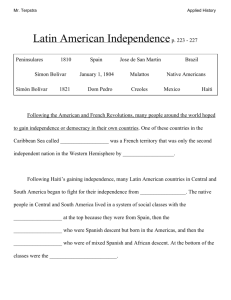
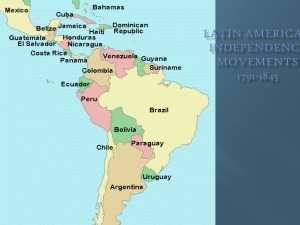
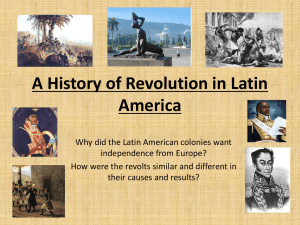
![Lesson 4.3 [WH] - MKHS](http://s3.studylib.net/store/data/008422552_1-b5d54a87b240306642b68067bfe9553e-300x300.png)

